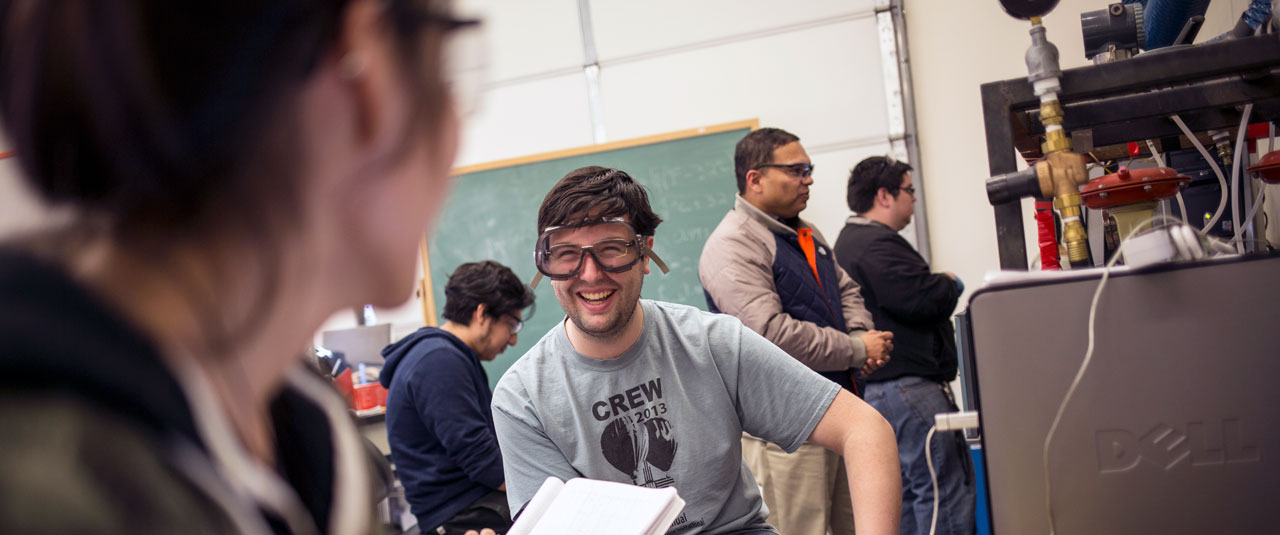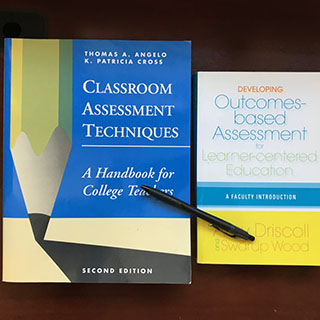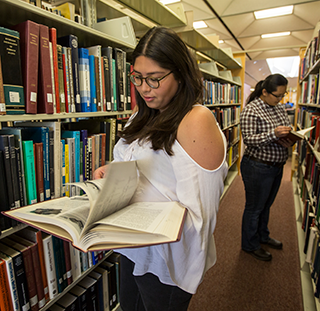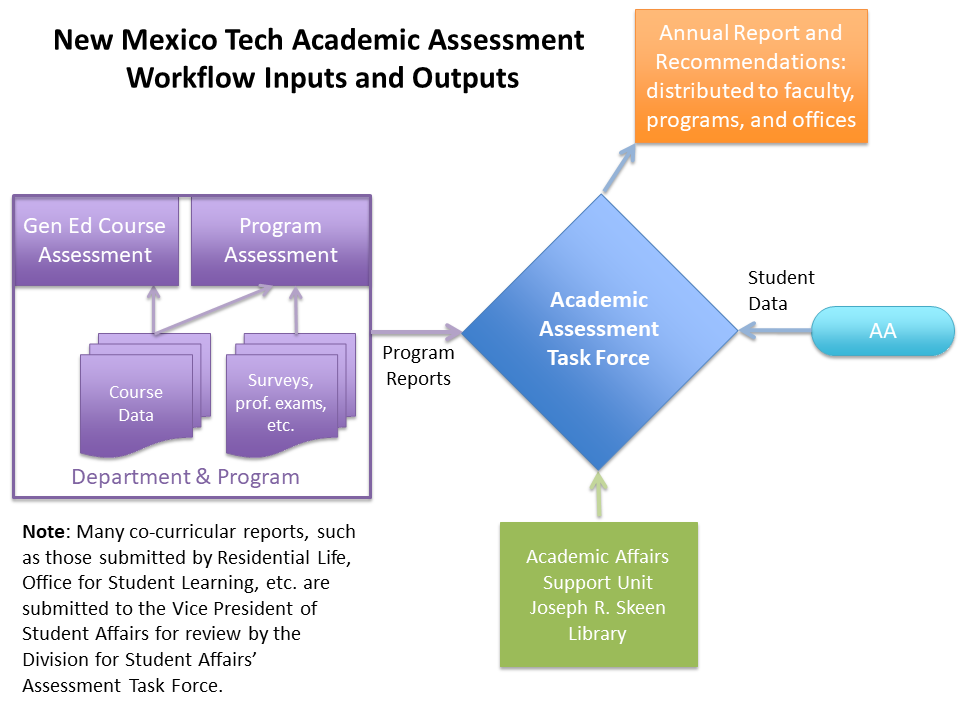
Assessment of Student Learning
 |
 |
| Assessment Primer |
Introduction
Assessment of student learning is critical to New Mexico Tech for a variety of reasons. Fundamentally, the purpose of assessment is to ensure that students gain the knowledge and skills necessary for them to function as professionals and members of the broader society. For background information on the basics of how assessment is conducted, please see our assessment primer. If you have any questions about assessment of student learning, or New Mexico Tech's internal processes for such assessment, please contact the Office of Academic Affairs (vpaa@nmt.edu).
Organization of Campus-Wide Assessment Activities
Assessment of Academic Activities
At New Mexico Tech, we perform a variety of assessment types including: course assessment, program assessment, co-curricular assessment, and general education assessment. The New Mexico Tech Academic Assessment Task Force is made up of faculty, staff, and administrators (see below) and is responsible for coordinating assessment activities focused on academic programs that includes conducting annual assessment reviews, and producing assessment reports. The current workflow for New Mexico Tech's academic assessment activities, including the central role of the Task Force, is summarized below.

The schedule for assessment reporting and review is as follows:
- October 1st: Assessment reports due to the Office of Academic Affairs
- December 1st: Assessment reports returned to departments with comments. Revisions may be requested.
- Early March: Final (in some cases, revised) reports included in the presentation developed for the Faculty Saenate and Annual Institute Report on Academic Assessment.
Co-Curricular Assessment
The Division of Student Life oversees a variety of offices and initiatives that support the academic success and holistic growth of students. Consequently, they oversee the assessment of these co-curricular initiatives including, but not limited to, activities undertaken by the Office for Student Learning, Center for Student Leadership and Engagement, and the Office of Housing & Residential Life.
2024-2025 Membership of New Mexico Tech's Assessment Task Force
| Name | Title | Role |
|---|---|---|
| Dr. Richard Thompson | Associate Vice President of Academic Affairs | Co-Chair |
| Dr. Aly El Osery | Dean of Graduate Studies | Co-Chair |
| Dr. Lynda Ballou | Instructor, Mathematics | Member |
| Dr. Taffeta Elliott | Associate Professor, Psychology | Member |
| Dr. Corey Leclerc | Professor, Chemical Engineering; Dean, College of Engineering | Member |
| Dr. Donghyeon Ryu | Associate Professor, Mechanical Engineering | Member |
| Dr. Steve Simpson | Professor, CLASS; Dean, College of Arts and Sciences | Member |
| Dr. Laura Waters | Assistant Professor, Earth & Environmental Science | Member |
| Dr. Andrei Zagrai | Professor, Mechanical Engineering | Member |
The review process is as follows:
- Reports are initially reviewed by a member of the Task Force using a Google Forms rubric. Results are compiled in an associated spreadsheet.
- The Office of Academic Affairs drafts a summary report for the institution based on this feedback for review by the Task Force.
- The Task Force meets and provides feedback on the reports and overall recommendations to academic departments, programs, and offices.
- The annual assessment report is presented at Faculty Senate each spring (either at their March or April meeting) and posted for campus access.
Classroom Assessment
All courses are required to have course learning outcomes explicitly detailed in the course syllabus, as well as a listing of the learning outcomes of the host department or program. The course learning outcomes are in some cases focused on skills or knowledge specific to the course, though broad outcomes are also often included. This activity is left up to individual instructors. Some of the data are reported to the department assessment coordinator for use in department/program assessment.
General Education Assessment
Courses required for the general education core curriculum are assessed by departments indepedent of their degree programs. This information is formally reported to the Office of Academic Affairs and reviewed by the Academic Assessment Task Force.
A statewide steering committee overhauled general education requirements for all public universities in New Mexico. This included developing common learning outcomes for general education courses based on essential skills and draft rubrics for conducting the assessment. New Mexico Tech currently has adopted these learning outcomes and revised its associated general education assessment practices. For more information, please visit our General Education Assessment page.
Department/Program Assessment
Assessment at this level is done separately for the undergraduate and graduate programs and Academic Affairs Support Units such as the Library. This effort is summarized in department assessment reports, which are produced on an annual basis (by academic year). Many have a common format, following a template provided by the Office of Academic Affairs. However, use of this template is not mandatory and the learning outcomes and assessment methods used by departments vary. There are fundamental differences between the assessment of our engineering programs and the arts and sciences programs, because the engineering programs are required to assess performance on learning outcomes prescribed by ABET. The engineering departments are, of course, allowed to assess additional outcomes if they wish, and in some cases do.